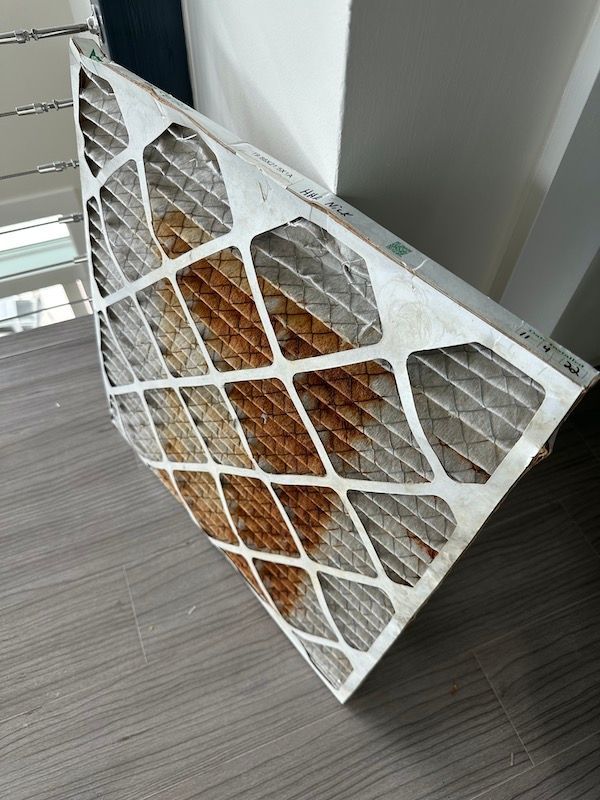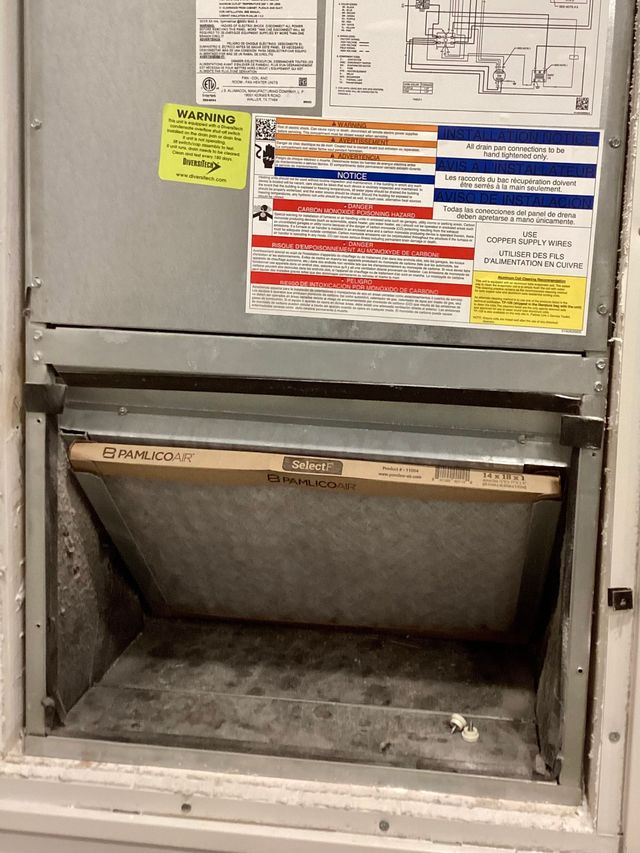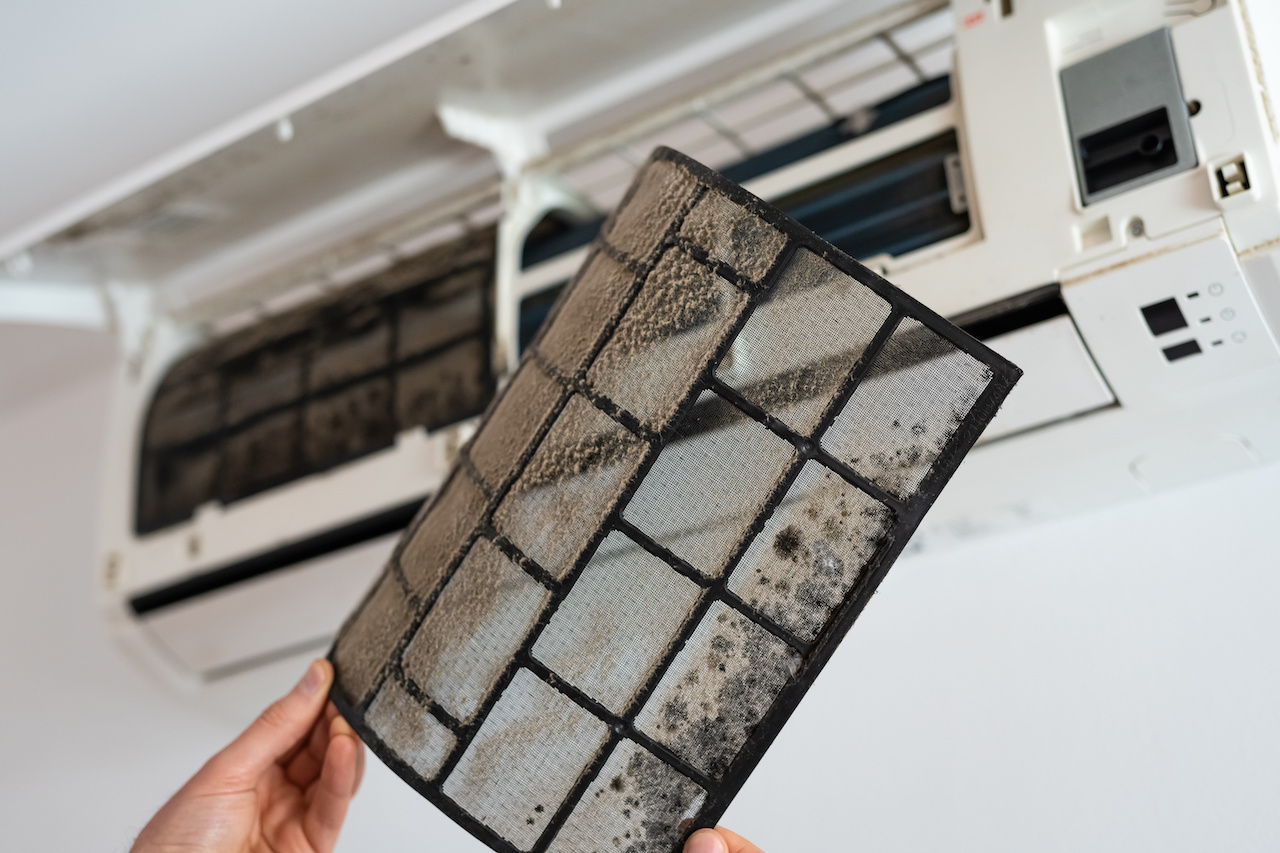Have you ever noticed a strange odor in your home, one that just doesn’t seem to go away? Or perhaps you’ve been experiencing unexplained allergy symptoms like sneezing or itchy eyes.
If so, the culprit might be lurking where you least expect it—your AC filter. Mold on your AC filter is more common than you might think, and it’s not just a minor inconvenience. It can affect your health, your energy bills, and even the lifespan of your air conditioning unit.
We’ll uncover the hidden dangers of mold on AC filters and provide you with practical tips to tackle this problem head-on. Trust us, you won’t want to miss this—your comfort and well-being could depend on it.

Credit: www.mymoldmasters.com
Causes Of Mold On Ac Filters
Mold on AC filters is a common problem in many homes. It can lead to poor air quality and health issues. Understanding the causes of mold growth can help you prevent it. Several factors contribute to mold development on AC filters. Below are key causes that encourage mold growth.
Humidity And Moisture
High humidity levels can foster mold growth. AC systems often deal with moisture. Excess moisture can accumulate on filters. This creates a perfect environment for mold. Regularly check humidity levels in your home. Use dehumidifiers to keep moisture in check.
Dust And Debris Accumulation
Dust and debris can clog AC filters. This blockage traps moisture and heat. Mold thrives in such conditions. Cleaning filters regularly can minimize debris build-up. Change filters often to ensure clean air flow. Keep surrounding areas free from dust.
Poor Ventilation
Poor ventilation can lead to mold growth. Air stagnation traps moisture and heat. This encourages mold development on filters. Ensure proper airflow in your home. Check vents and ducts for blockages. Improve ventilation to reduce mold risk.

Credit: www.mymoldmasters.com
Health Risks Of Mold Exposure
When you think about mold, you might picture unsightly spots on your bathroom ceiling or damp basement walls. However, mold can also thrive on your air conditioning (AC) filter, posing significant health risks. Understanding these risks is crucial for maintaining a healthy living environment. Let’s dive into how mold exposure can impact your health.
Respiratory Issues
Mold spores are tiny and can easily become airborne. When you breathe them in, they can irritate your respiratory system. Have you ever noticed a lingering cough or shortness of breath in your home? Mold might be the culprit. It’s particularly concerning for individuals with asthma or chronic respiratory conditions. Regularly checking and replacing your AC filter can help prevent these issues.
Allergic Reactions
Mold exposure can also trigger allergic reactions. Symptoms can range from sneezing and runny noses to more severe reactions like skin rashes. If you’ve experienced these symptoms at home, it might be time to inspect your AC filter. An unchecked mold problem can worsen over time, leading to more frequent and severe allergic reactions.
Impact On Immunocompromised Individuals
People with weakened immune systems are at a higher risk of serious health issues from mold exposure. If you or someone in your household is immunocompromised, the presence of mold can lead to infections and other health complications. Are you doing everything you can to ensure a safe environment? Regular maintenance of your AC system is a simple yet effective step.
Taking proactive measures can safeguard your health and improve the quality of the air you breathe. Have you checked your AC filter for mold lately? It might be time to take a closer look.
Identifying Mold On Ac Filters
Spotting mold on AC filters is crucial for maintaining air quality. Black or green spots often signal mold presence. Regular checks help prevent health risks.
Identifying mold on your AC filters is crucial for maintaining a healthy home environment. Mold can spread quickly and impact air quality, causing health issues. Spotting it early can save you trouble and money.Regularly inspecting your AC filters helps in catching mold growth early. This way, you ensure your air conditioning system functions efficiently, keeping your indoor air fresh and clean.###Visual Signs
Begin by examining your AC filters closely. Mold often appears as dark spots or fuzzy patches. These can be black, green, or even white.Check if the filter looks discolored. Compare it to a new filter if you’re unsure.It’s important to look at both sides of the filter, as mold can hide on the backside. Have you noticed any unusual spots lately?###Odor Detection
Mold has a distinctive musty smell. If your AC emits an unpleasant odor, it may be a sign of mold.Sniff around your AC vents. Is the smell stronger when the system is on?An odor that persists after changing the filter might indicate mold in other parts of the system. Have you noticed a lingering smell in your home?###Professional Inspection
Sometimes, mold isn’t easily visible or detectable by smell. In such cases, hiring a professional can be a smart move.Experts use specialized tools to identify mold in hard-to-see areas. They ensure your entire AC system is checked thoroughly.A professional inspection can provide peace of mind. Would you consider bringing in an expert if you’re unsure about the mold situation in your AC system?Spotting mold early can help maintain a healthy living environment. By using these methods, you can keep your air conditioning system clean and efficient. Have you checked your AC filters lately?Preventing Mold Growth
Mold on AC filters can affect air quality and health. Regularly clean or replace filters to prevent mold growth. Ensure proper ventilation and maintain humidity levels below 60% for a healthier home environment.
Preventing mold growth on your AC filter can enhance air quality. It can also extend the life of your HVAC system. Mold not only affects health but also reduces energy efficiency. Implementing simple strategies can keep your system mold-free and running smoothly.Regular Cleaning And Maintenance
Regularly cleaning your AC filter prevents mold buildup. Check your filter every month to assess its condition. Replace or clean it as needed. A dirty filter creates a perfect environment for mold. Regular maintenance also ensures optimal performance. It reduces energy bills and improves air quality. Set a reminder to inspect and clean your filter often.Improving Airflow
Proper airflow discourages mold growth. Ensure vents and registers are open and unobstructed. Blocked vents cause moisture buildup. Moisture leads to mold. Keep furniture and curtains away from vents. This allows air to circulate freely. Use a dehumidifier if your home is humid. It helps maintain ideal moisture levels. Good airflow also boosts system efficiency.Using Mold-resistant Filters
Consider using mold-resistant filters for your AC system. They are designed to inhibit mold growth. These filters have special coatings or materials. They actively prevent mold and mildew. Mold-resistant filters are easy to find in stores. They fit most HVAC systems. While slightly more expensive, they offer peace of mind. They keep your air clean and healthy.Removing Mold Safely
Dealing with mold on your AC filter can be daunting, but removing it safely is crucial for your health and home environment. Mold can compromise air quality and cause health issues. So, it’s essential to tackle it effectively. Whether you choose to do it yourself or hire a professional, understanding the right methods and precautions will ensure you handle the mold issue efficiently.
Diy Cleaning Methods
Cleaning mold from your AC filter yourself is possible if you follow the right steps. First, switch off the AC unit and remove the filter carefully. Mix a solution of water and vinegar; it’s a natural and effective cleaner. Scrub the filter gently with a brush dipped in the solution. Rinse thoroughly with water and let it dry completely before reinstalling.
Did you know that baking soda can also help? Sprinkle some on the moldy areas before scrubbing. It enhances cleaning and neutralizes odors. If the mold persists, it might be time to replace the filter entirely. Filters are inexpensive, and changing them regularly can prevent future mold growth.
Professional Mold Removal
Sometimes, DIY methods might not be enough, and calling a professional becomes necessary. Professionals have specialized equipment and treatments to remove mold effectively. They can assess the severity of the mold and tackle hidden areas that you might miss.
Consider professional help if your filter has extensive mold growth or if mold reappears shortly after cleaning. It may be indicative of a larger issue within your AC unit or ductwork. Investing in professional services can save you from potential health risks and expensive repairs down the line.
Safety Precautions
Safety should be your priority when dealing with mold. Always wear gloves and a mask to protect yourself from mold spores. Keep the area well-ventilated to prevent inhalation of spores during cleaning.
Avoid using harsh chemicals like bleach, especially if you have allergies or asthma. Natural solutions are often effective and safer for your health. Ensure that children and pets are kept away from the area until cleaning is complete.
Have you ever noticed mold on your filter and wondered how it impacts your health? Addressing it promptly can prevent respiratory issues and other health problems. Taking these precautions ensures a safe environment for you and your loved ones.
Regular Filter Replacement
Mold on your AC filter can lead to poor air quality. Regular filter replacement is essential to maintain healthy indoor air. Changing filters frequently helps prevent mold growth. It also enhances your AC’s efficiency and longevity.
Signs It’s Time To Replace
Does your home feel dusty all the time? It might be a sign to change your filter. A musty smell near the AC unit is another warning. If your energy bills are rising, your filter might be clogged. Check for visible mold or dirt on the filter. These are clear indicators for replacement.
Choosing The Right Filter
Not all filters are the same. Choose a filter with a high MERV rating for better filtration. Ensure the filter size matches your AC unit. Look for filters specifically designed to resist mold. Consider the frequency of filter changes based on your home’s needs. Opt for a reputable brand to ensure quality.
Long-term Solutions For Mold Prevention
Mold on your AC filter can harm your health and comfort. Effective long-term solutions for mold prevention ensure a healthier indoor environment. These methods not only tackle existing mold but also prevent future growth. Let’s explore some effective strategies to keep mold at bay.
Dehumidifiers And Air Purifiers
Dehumidifiers reduce indoor moisture, a key factor for mold growth. By maintaining low humidity levels, mold finds it hard to thrive. Place dehumidifiers in damp areas for best results.
Air purifiers with HEPA filters trap mold spores. They clean the air, reducing the risk of mold spreading. Choose a purifier suited for your room size for maximum efficiency.
Implementing A Maintenance Schedule
A regular maintenance schedule keeps your AC system mold-free. Change filters every one to three months. This prevents dirt and mold buildup.
Schedule professional HVAC inspections yearly. These check-ups catch mold issues early and ensure your system runs smoothly. Regular cleaning and servicing extend the lifespan of your AC unit.
By adopting these strategies, you create a mold-resistant environment. Your home remains comfortable and safe for everyone.
Benefits Of A Mold-free Ac System
Maintaining a mold-free AC system offers numerous benefits. Mold can negatively impact air quality and efficiency. A clean system ensures a healthy environment. This section explores why keeping mold at bay is essential.
Improved Air Quality
Mold spores in the air can cause health issues. They trigger allergies and respiratory problems. A mold-free AC filter ensures cleaner air. Breathing becomes easier and safer. Your home feels fresher and healthier.
Enhanced System Efficiency
Mold clogs up AC filters. This forces the system to work harder. Energy consumption increases, leading to higher bills. A clean filter improves airflow. It helps the AC run smoothly and efficiently. You save on energy costs.
Peace Of Mind
Worrying about mold growth can be stressful. Regular maintenance prevents mold buildup. This gives you peace of mind. You feel confident about your indoor air. Your family enjoys a safe, healthy environment.

Credit: yourmoldsolutions.com
Frequently Asked Questions
What Causes Mold On Ac Filters?
Mold grows on AC filters due to moisture. High humidity and dirt contribute to mold growth.
How Can Mold Affect Indoor Air Quality?
Mold releases spores into the air. These can cause allergies and respiratory issues. Poor air quality results.
How Often Should Ac Filters Be Cleaned?
Clean AC filters every month. Regular cleaning prevents mold and improves air flow. Keeps air fresh.
Can Mold On Filters Damage The Ac Unit?
Yes, mold can block airflow. It forces the AC to work harder. This may damage the unit over time.
What Are Signs Of Mold On Ac Filters?
Musty smell, visible spots, and reduced airflow. These indicate mold presence on filters. Check regularly.
Conclusion
Dealing with mold on your AC filter is crucial. It affects air quality and health. Regular cleaning keeps your home safe. Replace filters often to prevent mold growth. Inspect your AC unit frequently. Look for signs of mold early. Use dehumidifiers to control moisture levels.
This helps stop mold from forming. Healthy air means a healthier life. Protect your family with these simple steps. Keep your AC system in top shape. Your home will stay fresh and clean. Say goodbye to mold issues with regular care.
Take action today for a healthier environment.
